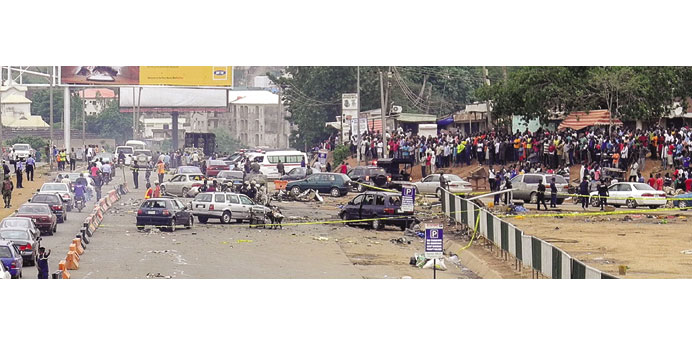Nigerian officials inspect the scene of a car bomb attack in Nyanya. The car bomb attack killed at least 19 people and injured more than 30 others, according to local reports.
Reuters/AFP/Abuja
Nigeria has urged delegates due for the World Economic Forum (WEF) in Abuja next week “not to let terror win” by staying away after a second bombing in the capital in less than three weeks.
A suspected car bomb killed 19 people and wounded 34 on Thursday night in the suburb of Nyanya, about 8km from Abuja city centre and next to the bush station where a rush-hour bomb attack killed 75 people on April 14.
The bombs, along with the abduction of 200 girls from a secondary school in the northeastern village of Chibok near the Cameroon border, threaten to overshadow the WEF conference’s emphasis on Africa’s positive growth story.
The girls, who were taking exams, were taken away on trucks on the same day as the bus station bombing.
Both attacks showed the powerlessness of Nigerian security forces to protect civilians against the militant Islamist group Boko Haram.
President Goodluck Jonathan’s government will mount a huge security operation to protect the WEF scheduled for next Wednesday and Thursday.
A regional replica of the Davos, Switzerland, event, it will bring together international leaders, policy-makers, entrepreneurs and philanthropists.
“We want to state categorically that the President Goodluck Ebele Jonathan administration will not be diverted nor will it give in to these nefarious acts of terrorism,” Finance Minister Ngozi Okonjo-Iweala said in a statement yesterday. “The government has taken the strongest measures to ensure a safe forum. We ask participants not to let terror win.”
Despite the repeated assurances on security, there were signs not all delegates were convinced that Nigerian authorities could keep the capital safe during the event.
Fernando de Sousa, general manager of Microsoft Africa Initiatives, cancelled his trip “for security reasons following the bombings in Abuja”, a PR company representing the firm said.
Boko Haram analyst Shehu Sani, who has written extensively on religious violence in Nigeria, said the twin Abuja bombings were intended “to send a clear message to the Nigerian government”.
The Islamists wanted to demonstrate that “they can hit anytime and anyplace at their own choosing”, Sani told AFP. “They are trying to show how weak and incompetent the security forces are.”
Much of Boko Haram’s recent violence has targeted the remote northeast, the group’s historic base, where more the 1,500 people have been killed this year.
Before April 14, Abuja had not been significantly hit by Boko for more than two years and Sani said the timing of the latest unrest may not have been coincidental.
“The insurgents had a long-term plan of attacking targets outside (the northeast),” he said. “They may be taking the opportunity to show that even the World Economic Forum can be disrupted.”
Babangida Bello told AFP he was selling oranges at Nyanya when he “suddenly heard a loud explosion” which caused panic at the station that services commuters who work in central Abuja but cannot afford the city’s exorbitant rents.
“Everybody was confused,” he said, adding that he saw a nearby drink-seller running for safety before flying shrapnel hit him in the head. “He fell inside a ditch ... and he died.”
National Emergency Management Agency (NEMA) spokesman Manzo Ezekiel told AFP that a car packed with explosives caused the blast and witnesses identified a small white Volkswagen as the vehicle in question.
“The explosion was from the white car. I saw fire, burning and dead bodies scattered everywhere,” said Victor Okeyode, a driver at the station.
He said a man parked the car and walked away before the explosion went off, suggesting the blast may have been set remotely, but there was no independent confirmation of the claim.
The Islamists, who want to install a mediaeval Islamic kingdom in Nigeria, claimed the previous bombing and authorities blame them for the second one and the abductions.
Interior Minister Abba Moro told Reuters that security in Abuja city centre would make it very difficult for any insurgents to find their way in.
He also said security forces were close to rescuing the missing girls.
“Defence high command is doing everything to secure the release of these girls. We are closing in on their location. Hopefully in the next couple of days, they will be rescued,” Moro said in a telephone interview.
But he added: “The government has to be careful. Any all-out forceful rescue of these kids could undermine their safety.”
He said efforts had been made to seek out possible intermediaries for negotiation to get back the girls but declined to give any details of actual talks.
The United States said on Thursday that it had offered to help Nigeria in its search for the schoolgirls. Britain has also offered support.
But parents of the missing pupils have started to despair of ever being reunited with them and they tend to disbelieve government claims that they are searching hard for them.
“We haven’t seen any soldier or security personnel going into the bush in search of the girls, so we really don’t understand where they are carrying out their search operation,” Malam Maina, one of the parents, told Reuters.
About 250 parents protested in the village on Thursday to demand swifter action.
Dozens of people protested outside Abuja’s parliament on Wednesday.
A Borno state senator, Ahmed Zannah, fears the girls have been taken as “wives” by Boko Haram commanders – a grim echo of Uganda’s Lord’s Resistance Army, which abducted thousands of girls from central Africa for the same purpose.
There has been no news of their fate beyond the roughly 50 who escaped.

